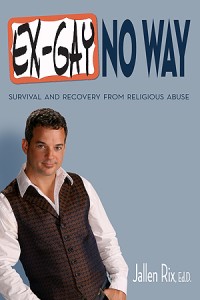Over 400 Ex-Gay Survivors Share Details Of Their Experience Trying To Change
-

Jallen Rix, an ex-gay survivor, curated the study for Beyond Ex-Gay
By Zack Ford
Beyond Ex-Gay is a community for survivors of any form of “sexual orientation change efforts” (SOCE), more commonly known as ex-gay therapy. Recently, they conducted a survey of the survivor community to gather some information about why people tried to change their sexuality and what they experienced, and the answers are revealing. Obviously this sample is biased because it’s all people who abandoned ex-gay therapy, but nonetheless, here are the stories of over 400 people who tried to “pray away the gay” — and failed.
Where Do “Unwanted Same-Sex Attractions” Come From?Those who justify SOCE often claim that people who have “unwanted same-sex attractions” should have the right to pursue therapy to change those attractions. The use of that language — “attractions” instead of “orientation” — disguises the concept as something seemingly less permanent that truly can be changed. All major professional psychologists and psychiatrists recommend affirming whatever a person’s orientation is, and it’s telling that SOCE advocates never address why clients’ orientation might be “unwanted.”
Here were the top ten reasons the survivors entered ex-gay therapy:
To be a better Christian.
I believed it was what God wanted me to do.
I feared I would be condemned by God.
The desire to fit in with everyone, to feel “normal.”
Cultural pressure to conform to heterosexuality.
Desire to please family and friends.
I feared I would go to hell for being gay.
Fear of losing family and friends.
Misinformation of what it meant to be gay.
Self-hatred & internalized homophobia.In other words, the driving factor as to why individuals has “unwanted” attractions is because their church, friends, family, and community all shame them into feeling that way. It’s a profit cycle, with SOCE advocates condemning homosexuality specifically to attract clients into ex-gay therapy — whose narratives they then use to continue condemning homosexuality.
Does Ex-Gay Therapy Cause Harm?Any doubt about whether SOCE is harmful can be clarified by its survivors, 92 percent of whom said they experienced harm. In fact, 16 percent went so far as to say it “devastated my life,” with another 31 percent saying that they were “harmed a lot.” When answering another question about why they stopped pursuing ex-gay therapy, 22 percent said it was because they “had a nervous breakdown.” Harms that were documented included shame (80 percent), emotional harm (79 percent), depression (72 percent), reinforced self-hate, (63 percent), and strikingly, 41 percent of those who said they were harmed said they felt suicidal because of the therapy.
Of those who say they experienced harm from SOCE, 84 percent say it still affects them to some extent today.
Are Young People Particularly Vulnerable To Ex-Gay Therapy?Respondents were asked what age they began to pursue an ex-gay experience, and though the range was 43 years wide, the average age was 22.4 years old. In fact, the most common age people began some form of treatment was 18-20, with significant numbers starting as young as 15.
Last year, California passed a law banning SOCE for minors, though it is currently being challenged in court by conservative groups. New Jersey and a few other states are considering similar laws. These are important protections, because young people are particularly vulnerable to pressure from their families and communities as described above, and minors have no consent if they are forced into the treatment.
What Happens In Ex-Gay Therapy?SOCE is often defined by what survey editor Jallen Rix describes as the “squeaky wheel,” the most crazy (i.e. marketable for television) claims that are discussed on talk shows, like exorcisms and “touch” therapy. In this survey, those extreme practices represented a minority of the experiences. Instead, respondents described more familiar forms of ministry and therapy, with 70 percent saying their experiences involved receiving prayer, one-on-one counseling, and using self-guided tools like books. This is important to note given the high rates of harm that they experienced — it does not require the more extreme treatments to cause stigma and shame.
Too often, the lived experience of ex-gay survivors is lost when discussing SOCE. This important survey, with its many written responses, creates a new visibility for just what happens in ex-gay therapy. Box Turtle Bulletin has highlighted some of the profound written responses, and they can all be perused on Beyond Ex-Gay’s site.
-
It is hard to get well from religious abuse O.o
-
It is hard to get well from religious abuse O.o
Indeed it is much harder than just coming out to begin with IMHO.
-
I know someone in my church who has been through ex gay and it appears to be successful. However I do have questions regarding its success. He says he wants to be married and stuff and he's the only one I would discuss any LGBT stuff with because I generally do not mention sexual orientation in front of church people unless they show themselves to be worthy of such discussion.
-
I know someone in my church who has been through ex gay and it appears to be successful. However I do have questions regarding its success. He says he wants to be married and stuff and he's the only one I would discuss any LGBT stuff with because I generally do not mention sexual orientation in front of church people unless they show themselves to be worthy of such discussion.
I doubt it, he probably still fantasizes about men just doesn't act as much on it